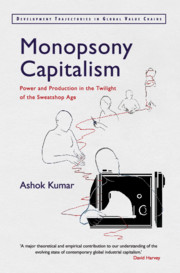Book contents
- Frontmatter
- Dedication
- Contents
- List of Figures
- Acknowledgements
- Introduction: The Enduring Age of the Sweatshop
- PAST
- PRESENT
- 3 China: A Strike at a Giant Footwear Producer
- 4 India: A Warehouse Workers’ Struggle at a ‘Full-Package’ Denim Firm
- 5 Honduras: A Transnational Campaign at a Cotton Commodity Producer
- FUTURE
- Conclusion: The Twilight of the Sweatshop Age?
- Bibliography
- Index
3 - China: A Strike at a Giant Footwear Producer
from PRESENT
Published online by Cambridge University Press: 15 January 2020
- Frontmatter
- Dedication
- Contents
- List of Figures
- Acknowledgements
- Introduction: The Enduring Age of the Sweatshop
- PAST
- PRESENT
- 3 China: A Strike at a Giant Footwear Producer
- 4 India: A Warehouse Workers’ Struggle at a ‘Full-Package’ Denim Firm
- 5 Honduras: A Transnational Campaign at a Cotton Commodity Producer
- FUTURE
- Conclusion: The Twilight of the Sweatshop Age?
- Bibliography
- Index
Summary
On the morning of 15 April 2014, 43,000 of the 60,000 workers employed in Yue Yuen's Gaobu factories in Guangdong Province downed tools and walked off the job. Within two weeks, the largest strike at a private company in Chinese history had drained Yue Yuen of more than $60 million in lost profits and exacted benefits. What was astonishing about this strike was that it occurred in the footwear sector – a decidedly ‘buyer-driven’ GVC – at facilities that exclusively produce for major buyers Nike and Adidas. Even more, the supplier was able to absorb the costs and workers were able to win some concessions in a historically low-value sector with the buyers unable or unwilling to relocate production to a different supplier.
The rise of Yue Yuen and its strike typifies capital–labour relations of the contemporary Chinese economy. Indeed, growth in Chinese industrial capacity outpaced labour, causing a pronounced power shift, since ‘bosses are short of workers and workers are short of patience’ (Economist 2010) despite reports of a manufacturing downturn in 2012 following a two-year strike wave (Barboza 2012). The export-oriented industrial provinces of Guangdong and Zhejiang in South China have become a hotbed of worker unrest (Silver and Zhang 2009) and since strikes exist in a legal grey area – neither outlawed nor permitted, thus sometimes allowed and other times repressed – it has made China the site of more wildcat strikes than any other country in the world (Friedman 2015). And as labour shortage and worker pressure mounted, employers were forced to accommodate, allowing real wages to rise by 12 per cent per annum since 2001. Workers often succeeded in wresting double-digit salary increases from their employers (Friedman 2014). Indeed, ‘by the end of 2010, Chinese media commentators were [already] declaring that the era of low-wage labour had come to an end’ (Friedman 2012).
Here, I examine the 2014 strike at Yue Yuen in the Pearl River Delta (PRD) region of southeast China.4 It contributes to the argument of the book that firms, adapting from assembly-only affairs to integrated monopolistic suppliers, transformed previously asymmetrical power imbalance between global brands (‘buyers’) and producers (‘suppliers’) to a more symbiotic relationship.
- Type
- Chapter
- Information
- Monopsony CapitalismPower and Production in the Twilight of the Sweatshop Age, pp. 89 - 119Publisher: Cambridge University PressPrint publication year: 2020

